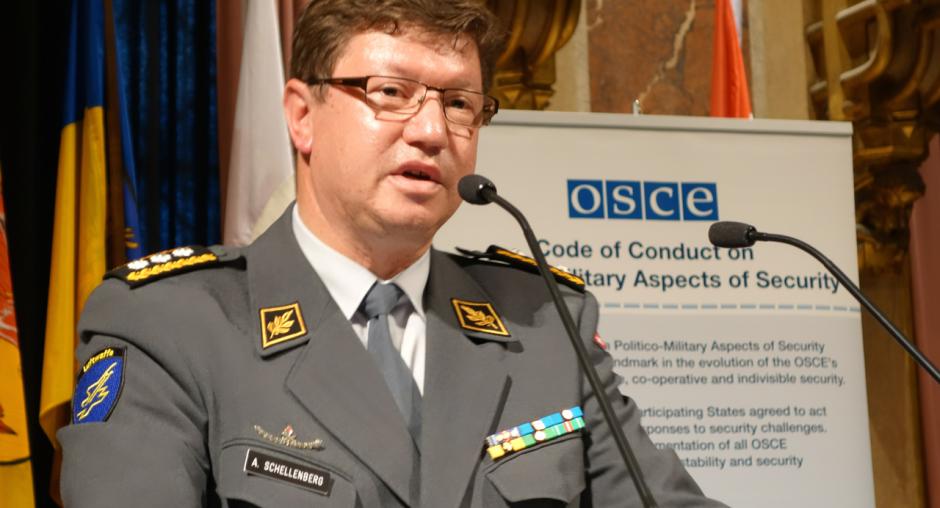After 20 years, OSCE Code of Conduct still plays essential role in setting norms in security sector governance

VIENNA, 8 July 2014 – Twenty years after its adoption, the OSCE Code of Conduct on Politico-Military Aspects of Security remains an indispensable instrument in exercising democratic control of the armed and security forces, guaranteeing their political neutrality, fostering human rights of service personnel, and governing security relations between States, stressed the speakers at the occasion of the 20th anniversary of the Code of Conduct held today in Vienna.
This event was held at the Military History Museum of the Austrian Armed Forces. It was co-organized by Austria, Germany, Switzerland as the OSCE 2014 Chair, and Moldova, which is currently heading the OSCE Forum for Security Co-operation.
The OSCE Code of Conduct on Politico-Military Aspects of Security was adopted by the CSCE Forum for Security Co-operation in Budapest in December 1994. This landmark document in security sector governance calls OSCE participating States to ensure democratic oversight of their armed, internal, paramilitary, intelligence and police forces, taking into account their cultural, historical, religious and social specificities. The Code of Conduct also addresses key principles on relations between participating States. The States are further to ensure that their armed forces remain politically neutral and to guarantee that the human rights of security personnel are respected.
The commander of the Swiss Air Force, Lieutenant General Aldo C. Schellenberg, addressing the event participants, emphasized that raising awareness, enhancing implementation and outreach of the Code is one of the priorities of the OSCE Chairmanship of Switzerland and requires a permanent effort by all participating States, especially in times of politico-military crises.
"Twenty years after its adoption, the Code of Conduct has gained, once again, an “unwanted” topicality during the current crisis in Ukraine. In the past years the emphasis was laid on intra-State aspects, such as the democratic control of armed and security forces, the implementation of international humanitarian law, the law of armed conflict and the safeguarding of rights and duties of armed forces personnel. The last months have now shown a growing need to re-focus on inter-State aspects, such as the right of participating States to freely choose their own security arrangements, the respect for each other's sovereign equality and individuality, and the organization of mutual security relations among participating States upon a co-operative approach.”
On 9 July, representatives of OSCE participating States and Partners for Co-operation will gather in Vienna for the “Third Annual Discussion on the Implementation of the Code of Conduct” to report on and discuss achievements, loopholes and challenges in their respective countries and regions.
“The Code of Conduct has never been as actively discussed, implemented and promoted as now, twenty years after its entry into force. However, despite relentless awareness-raising and implementation support, norms and principles of the Code of Conduct are still violated with discouraging frequency in the OSCE area.” Therefore, Schellenberg called on all OSCE participating States to renew their efforts in duly implementing the provisions of the Code and thus contribute to restoring and strengthening confidence and security in the OSCE area.
Later this year, the Swiss Chairmanship will prepare a commemorative publication on the history, development, achievements and outreach of the OSCE Code of Conduct.
